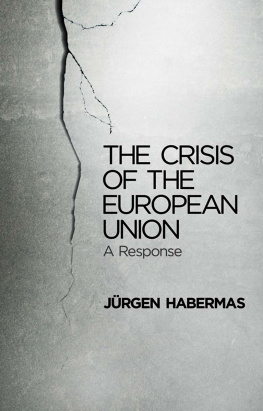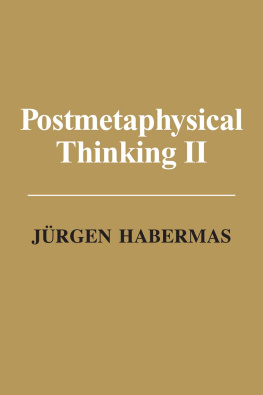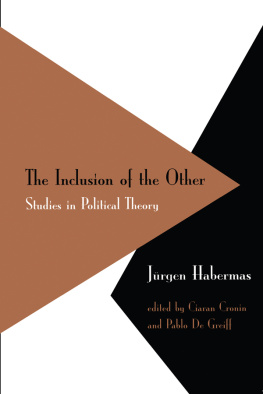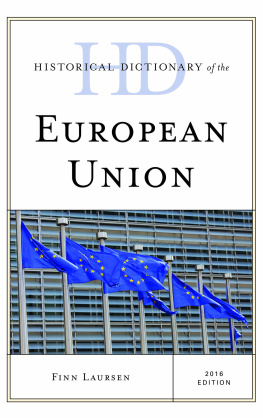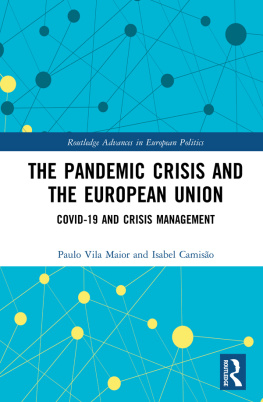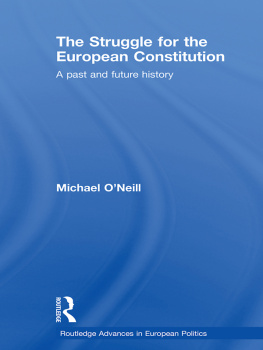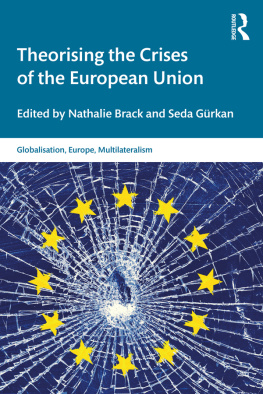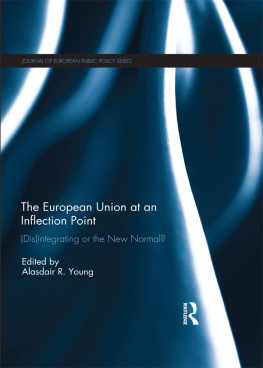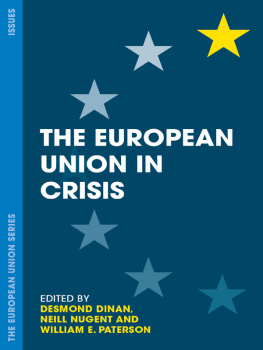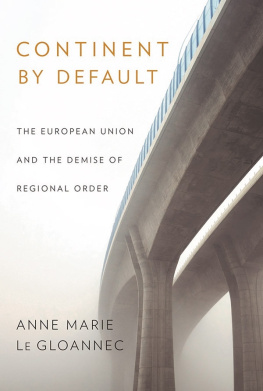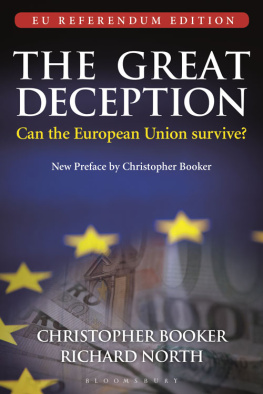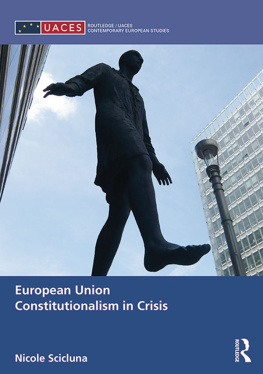The Crisis of the European Union
First published in German as Zur Verfassung Europas. Ein Essay Suhrkamp Verlag Berlin 2011
This English edition Polity Press, 2012
Polity Press
65 Bridge Street
Cambridge CB2 1UR, UK
Polity Press
350 Main Street
Malden, MA 02148, USA
All rights reserved. Except for the quotation of short passages for the purpose of criticism and review, no part of this publication may be reproduced, stored in a retrieval system, or transmitted, in any form or by any means, electronic, mechanical, photocopying, recording or otherwise, without the prior permission of the publisher.
ISBN-13: 978-0-7456-8153-5
A catalogue record for this book is available from the British Library.
The publisher has used its best endeavours to ensure that the URLs for external websites referred to in this book are correct and active at the time of going to press. However, the publisher has no responsibility for the websites and can make no guarantee that a site will remain live or that the content is or will remain appropriate.
Every effort has been made to trace all copyright holders, but if any have been inadvertently overlooked the publisher will be pleased to include any necessary credits in any subsequent reprint or edition.
For further information on Polity, visit our website: www.politybooks.com
Contents
Preface
Since 2008 we have been witnessing the laborious learning process of the German federal government as it moves reluctantly in small steps towards Europe. Over the past two-and-a-half years it first insisted on unilateral national responses, only to go on to haggle over rescue parachutes, to send out ambiguous signals and to drag its feet over concessions. Now, finally, it seems to have come to the realization that the ordoliberal dream of voluntary stability criteria to which the budgets of the member states were supposed to conform has failed. The dream of the mechanisms which are supposed to render the process of reaching joint political decisions superfluous and to keep democracy in check has been shattered not only by the differences in economic cultures but above all by the rapidly changing constellations of unpredictable environments. Now all the talk is of the construction flaw of a monetary union that lacks the requisite political steering capacities. There is a growing realization that the European treaties have to be revised; but there is a lack of a clear perspective for the future.
The plans recently in circulation would confine the joint governance of the seventeen euro states to the circle of the heads of government, thus to a core of the European Council. Since this governing body is not able to make legally binding decisions, reflection is concentrating on the kinds of sanctions to be imposed on disobedient governments. But what is actually being proposed here? Who is supposed to force whom to obey decisions with what content? Now that the rigid stability criteria have been extended and flexibilized into the invocations of the pact for Europe, the decisions of the European Council are supposed to expand to cover the broad spectrum of all those policies that could influence the global competitiveness of the national economies that have drifted apart. Thus, the European agreements would intervene in the core domains of the national parliaments, from fiscal and economic policy, through social policy, to education and employment policy. The procedure envisaged seems to be that, in order to ensure the political implementation of all goals agreed upon with their colleagues in Brussels, the heads of government would organize majorities in their respective national parliaments under threat of sanctions. This kind of executive federalism of a self-authorizing European Council of the seventeen would provide the template for a post-democratic exercise of political authority.
As was to be expected, this intergovernmental undermining of democracy is meeting with resistance from two sides. The defenders of the nation state are seeing their worst fears confirmed and are now barricading themselves more than ever behind the faades of state sovereignty, even though these were breached long ago. However, in the current crisis they have lost the support of a business lobby whose interest up to now lay in keeping both the common currency and the common market as free as possible from political interventions. On the other side, the long-mute advocates of the United States of Europe have again found their voice, though with this emphatic conception they frustrate their own goal of first promoting integration in core Europe. For with this proposal the well-founded opposition to the precipitous path to a bureaucratic executive federalism becomes entangled in the hopeless alternative between nation state and European federal state. A vague federalism which fails to negate this false alternative in a clear-cut way is no better.
With my essay on the constitution for Europe that is, on its current state and its political make-up I want to show, on the one hand, that the European Union of the Lisbon Treaty is not as far removed from the form of a transnational democracy as many of its critics assume. On the other hand, I want to explain why the construction flaw of the monetary union cannot be rectified without a revision of the treaty. The current plans to coordinate the decisions of the EMU states in major areas of policy call for an extended basis of legitimation. However, the constitutional model of a federal state is the wrong one for such a transnational democracy. Once we come to see the European Union as if it had been created for good reasons by two constitution-founding subjects endowed with equal rights namely, co-originally by the citizens (!) and the peoples (!) of Europe the architecture of the supranational but nevertheless democratic political community becomes comprehensible. Thus we need only to draw the correct conclusions from the unprecedented development of European law over the past half-century.
The political elites continue to shy away from the daunting prospect of a revision of the treaty. Presumably this hesitation is not just a matter of opportunistic power interests and a lack of decisive leadership. The economically generated apprehensions are inspiring a more acute popular awareness of the problems besetting Europe and are lending them greater existential significance than ever before. The political elites should embrace this unusual boost in public prominence of the issues as an opportunity and also regard it as a reflection of the extraordinary nature of the current situation. But the politicians have also long since become a functional elite. They are no longer prepared for a situation in which the established boundaries have shifted, one which cannot be mastered by the established administrative mechanisms and opinion polls but instead calls for a new mode of politics capable of transforming mentalities.
I would like to use the means at my disposal to try to remove mental blocks that continue to hinder a transnationalization of democracy. In doing so, I will situate European unification in the long-term context of a democratic legal domestication and civilization of state power. This perspective should make it clear that the pacification of belligerent nations hence the goal that motivated not only the foundation of the United Nations but also the process of European unification after the Second World War has created the preconditions for realizing a more far-reaching goal, namely, the construction of political decision-making capabilities beyond the nation states. The time when the constitutionalization of international law was focused exclusively on the goal of pacification, which also marked the beginning of the development of the European Union, is long past. The shattering of neoliberal illusions has fostered the insight that the financial markets indeed, more generally, the functional systems of world society whose influence permeates national borders are giving rise to problems that individual states, or coalitions of states, are no longer able to master. This need for regulation poses a challenge for politics as such, politics in the singular, as it were: the

